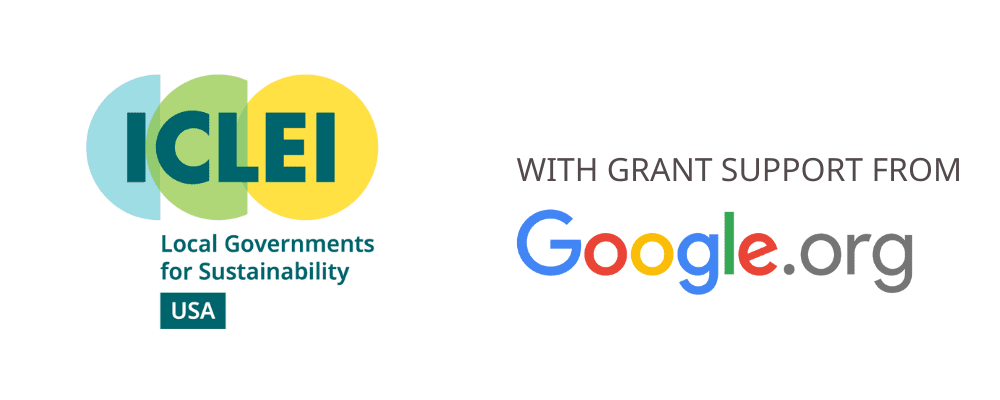Thanks to the grant support of Google.org, the ICLEI USA Action Fund has three awardees with projects currently underway. Totaling $3 million, the Action Fund projects will support inclusive environmental action through nonprofit partnerships in East Bay, California; Denver, Colorado; and Pittsburgh, Pennsylvania. The following provides an update for each of the projects, including highlights, challenges, and next steps.
ICLEI USA Action Fund #1: Healthy Homes Program – Denver, CO
Led by Energy Outreach Colorado (EOC), the Healthy Homes Program aims to redesign the traditional weatherization process with a data-led approach to determine cost-avoidance benefits (health and energy) rather than the traditional cost-effectiveness benefits (energy-only). Partnering with Denver-area hospitals, EOC will support low-income residents who are experiencing negative health outcomes as a result of aging housing stock, and provide a national model for equitable program development.
In October 2023, the first Healthy Home retrofit was completed, and demonstrated that the average net cost of $48,832 would be required to retrofit each home. One of the challenges that EOC now faces is determining how to replicate this project while reducing the average costs per home. With the support of the Colorado Energy Office, in 2024, EOC aims to leverage the rebates associated with the Inflation Reduction Act (IRA) in order to bring the average net cost down to $34,832 per home.
The next step in the program is for ICLEI USA to lead a design charrette in the Denver/Boulder area in Quarter 1 of 2024, and we would like to extend an invitation for Google.org and Google LLC to participate in this activity. Furthermore, EOC and ICLEI USA will continue to monitor the state rollout of IRA funds and maximize the opportunity to apply them to the Healthy Homes Program.
ICLEI USA Action Fund #2: Home Electrification Equity Project (HEEP) – East Bay, CA
Habitat for Humanity East Bay/Silicon Valley is working to address the California East Bay climate emergency and housing affordability crisis in concert. The aim of HEEP is to reduce greenhouse gas emissions while simultaneously providing opportunities for low-income families.
While programs and funds are available to assist low-and moderate-income residents with basic health and safety upgrades, public resources are not fully maximized for climate and environmental justice impacts due to funding restrictions, siloed program delivery, lack of training, and disparate data sources. As such, a primary objective of HEEP is to reduce the silos in program delivery and increase the public resources available for equitable projects such as this.
This project had a later start date than the other two Action Funds; however, the program is still collecting data, and we will be able to provide more concrete updates in January 2024. The next phase in the project will include:
- Finalizing criteria for pilot project selection and implementation roles between project partners
- Building out a pipeline of homeowner clients and conducting energy audits of participating homes
- Developing workshop to train local contractors
- Begin implementation and scaling up the project in early 2024
ICLEI USA Action Fund # 3: Tree Equity, Heat Abatement – Pittsburgh, PA
Resilient Cities Catalyst (RCC) and the City of Pittsburgh will develop a new property-level heat-energy vulnerability index whose measurements would provide city decision-makers with the ability to more effectively target green infrastructure investments and create opportunities for U.S. cities to explore ways to incentivize properties to reduce heat-contribution.
To date, RCC developed a Green Infrastructure Advisory Board of 8 local government representatives that convened to discuss best practices and needs in data, workforce, and innovative finance. In September 2023, they identified data and opportunities for trees in the city by neighborhood and incorporated street-level data. This analysis looked at the areas where climate-related risks are particularly high, and the urban canopy is relatively sparse. Through this, the project team has worked to identify the city’s “missing” potential trees and to quantify the ecosystem benefits that could be provided if these trees were planted and maintained.
In November 2023, the two Community Pilots were completed in the neighborhoods of Beltzhoover and Hazelwood in partnership with the local nonprofit Tree Pittsburgh. These communities were selected due to high exposure to extreme heat and stormwater runoff, as well as high rates of energy-burdened households. As a next step, RCC will review the pilot project results and collaborate with Google’s Auto Arborist team to address data source needs.



